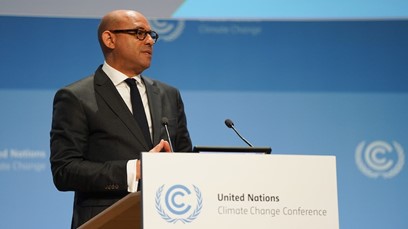
UN Climate Chief Calls for Drastic Shift in Investment to Tackle Climate Crisis in Africa
UN climate chief Simon Stiell urged global leaders on Thursday to shift from chronic under-investment in Africa to seizing the continent's vast potential for renewable energy and climate resilience. Speaking at a conference of African environment ministers in Abidjan, Côte d'Ivoire, Stiell emphasized that investing in Africa's green transition could unlock substantial economic and social benefits, positioning the continent as a leader in climate solutions.
Stiell highlighted Africa's disproportionate vulnerability to climate change, as temperatures across the continent rise faster than the global average. Deadly floods, droughts, and heatwaves are becoming more frequent, wreaking havoc on African economies. The World Meteorological Organization (WMO) reports that climate-related hazards are costing African countries between 2% and 5% of their GDP annually.
Stiell cautioned world leaders—particularly those from the G20 group of major economies—not to dismiss Africa's climate impacts as a distant issue, emphasizing, "We are all in this crisis together."
Unlocking Africa's Climate Potential
To drive change, Stiell called for "exponential changes" in business practices and investments to bolster Africa's climate resilience. He highlighted the potential for renewable energy sources like solar and wind, energy efficiency, clean cooking solutions, and adaptation measures. However, current investment levels fall short. African countries need an estimated $277 billion annually to fund their climate action plans, but they receive only a fraction of that amount.
In 2023, investments in clean energy across Africa totaled $39 billion—just 2% of global clean energy investments. Meanwhile, fossil fuel projects still dominate energy investments in Africa. Climate adaptation, which is crucial for mitigating the impacts of climate change, faces a similar funding gap. Sub-Saharan Africa needs between $30 billion and $50 billion annually for adaptation, yet only $10.8 billion was received between 2021 and 2022.
Poverty, Food Security, and Adaptation Challenges
Youssef Nassef, the UNFCCC's director for adaptation, pointed out that climate change is worsening poverty, undermining food security, and negatively affecting children's development across Africa. Despite these challenges, only 21 of Africa's 54 nations have submitted National Adaptation Plans, which are vital for securing funding for climate resilience efforts. Nassef expressed concern over the limited capacity of the poorest nations to develop these plans.
Climate Finance in Focus at COP29
The upcoming COP29 UN climate summit in Baku, Azerbaijan, will be a key moment for advancing climate finance, with countries expected to agree on a new collective quantified goal (NCQG) to channel more funding into adaptation and clean energy for developing nations. However, deep divisions remain, particularly over who should contribute to this fund. Wealthier nations have pushed for high-emitting emerging economies, like China and Gulf states, to contribute.
Meanwhile, China pledged $51 billion to support Africa's infrastructure, agriculture, and trade, including 30 clean energy and green development projects.
Stiell stressed that COP29 must signal that the climate crisis is a "core business" for every government, with finance solutions to match. He also called for progress on other funding mechanisms, such as global carbon markets and the operationalization of the new loss and damage fund, all of which could drive climate progress in Africa.
"An Africa ascending, an Africa empowered to take bolder climate actions is in every nation's interest," Stiell concluded.